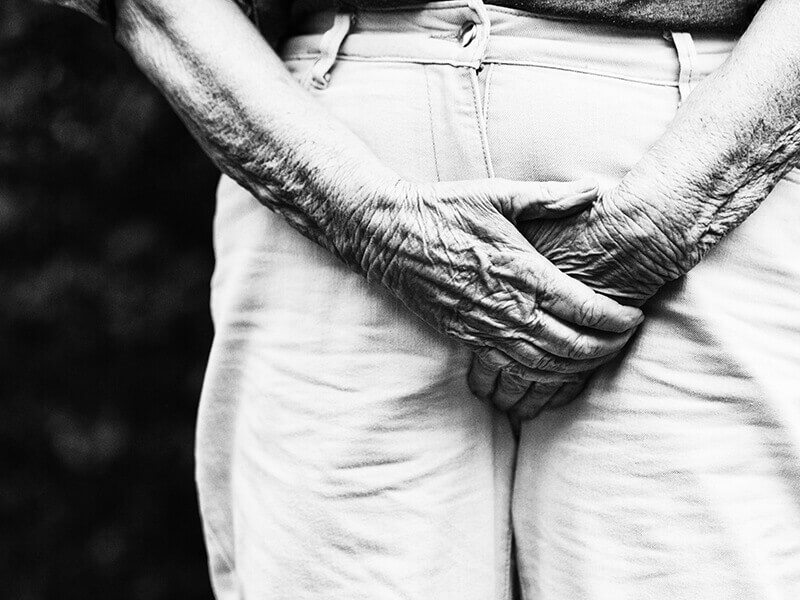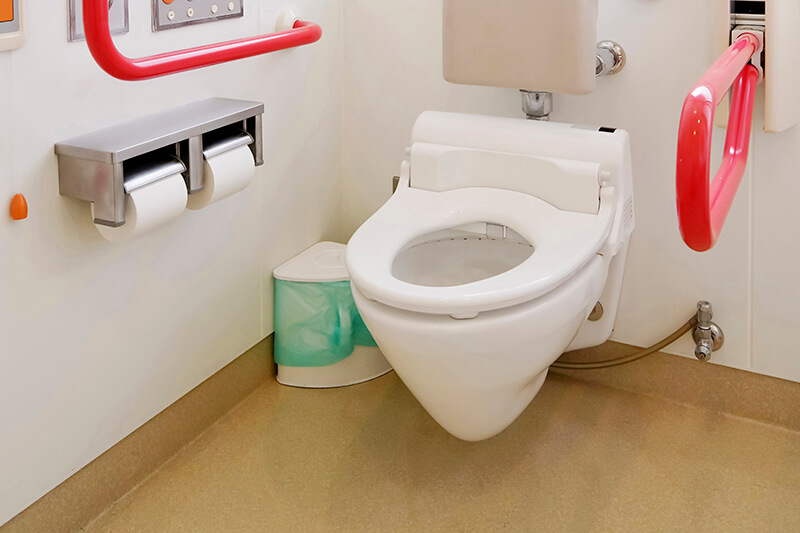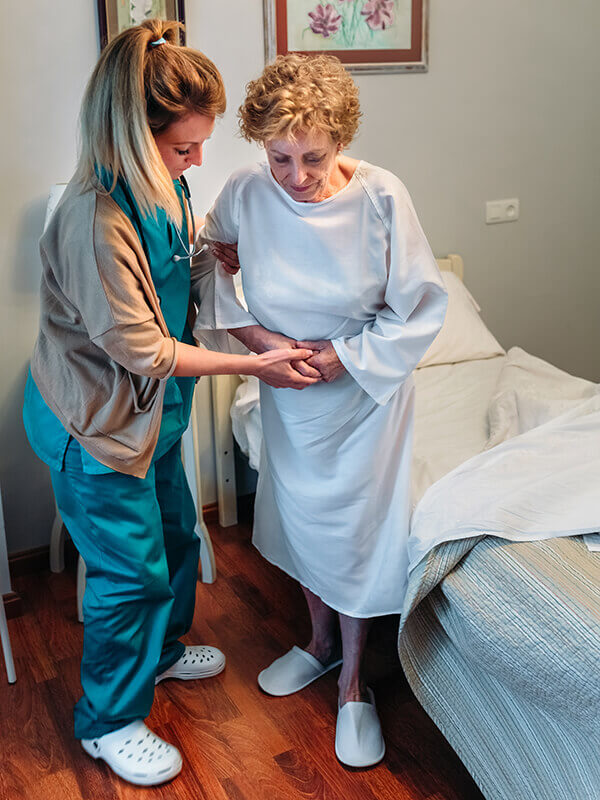




By being aware of the factors that can aggravate incontinence it can help support individuals and help them to manage their situation. Psychological conditions can be associated with incontinence, including depression and dementia.
Symptoms of urinary incontinence include:
Bowel incontinence can also be an issue for older individuals. Bowel incontinence, or faecal incontinence, is when you have problems controlling your bowels.
Symptoms of bowel incontinence can include:
There are many factors that can cause bowel incontinence, this may include:
Being aware of the factors that can aggravate incontinence can help support individuals. Factors that can worsen incontinence include:
Drwy fod yn ymwybodol o'r ffactorau a all waethygu anymataliaeth, gellir rhoi cymorth i unigolion a'u helpu i reoli eu sefyllfa. Gall cyflyrau seicolegol fod yn gysylltiedig ag anymataliaeth, gan gynnwys iselder a dementia.
Mae symptomau anymataliaeth wrinol yn cynnwys y canlynol:
Gall anymataliaeth y coluddyn hefyd fod yn broblem i unigolion hŷn. Ystyr anymataliaeth y coluddyn, neu anymataliaeth ysgarthol, yw problemau wrth reoli eich coluddion.
Gall symptomau anymataliaeth y coluddyn gynnwys y canlynol:
Mae sawl ffactor a all achosi anymataliaeth y coluddyn, gan gynnwys:
Gall bod yn ymwybodol o'r ffactorau a all waethygu anymataliaeth helpu wrth roi cymorth i unigolion. Mae'r ffactorau a all waethygu anymataliaeth yn cynnwys y canlynol:

Helping individuals to maintain continence and either reduce or eradicate incontinence is important. All individuals should be actively supported to participate in the management and treatment of their continence care.
When taking an individual to the toilet, it’s important that their dignity is preserved. This may include closing the door and if the individual wishes, then for the worker to wait outside until they have finished.
Products such as absorbent pads or urine collecting devices (sheaths, hand held urinals, faecal collectors) can maintain social continence but treatment must always be the preferred option.
Using specific pads; properly used, pads can help to maintain dignity and independence.
Support for regular toileting and creating a toileting regime is essential in order to reduce the risk of any accidents happening as accidents may cause embarrassment.
A variety of aids to collect urine, and to prevent urine leakage are available which may assist continence for individuals. Occupational therapists/community nurses can provide guidance on this.
Mae helpu unigolion i gynnal ymataliaeth a naill ai i leihau neu ddileu anymataliaeth yn bwysig. Dylid rhoi cymorth penodol i bob unigolyn gymryd rhan wrth reoli eu gofal ymataliaeth a'u triniaeth.
Wrth fynd ag unigolyn i'r toiled, mae'n bwysig sicrhau ei urddas. Gall hyn gynnwys cau'r drws ac, os bydd yr unigolyn am iddo wneud hynny, i'r gweithiwr aros y tu allan tan iddo orffen.
Gall cynhyrchion fel padiau amsugno neu ddyfeisiau sy'n casglu wrin (gweiniau, wrinalau a ddelir â llaw, casglwyr ysgarthol) gynnal ymataliaeth gymdeithasol ond rhaid ystyried triniaeth fel y dewis opsiwn bob amser.
Defnyddio padiau penodol; os cânt eu defnyddio'n gywir, gall padiau helpu i sicrhau urddas ac annibyniaeth.
Mae cymorth i fynd i'r toiled yn rheolaidd a chreu trefn ar gyfer mynd i'r toiled yn hanfodol er mwyn lleihau'r risg y bydd damweiniau yn digwydd ac o bosibl yn achosi cywilydd i'r unigolyn.
Mae amrywiaeth o gymhorthion i gasglu wrin ac i atal wrin rhag gollwng ar gael, a all helpu mewn perthynas ag ymataliaeth. Gall therapyddion galwedigaethol/nyrsys cymunedol ddarparu arweiniad.

As individuals age, they may require more assistance with personal care such as washing and dressing as they may struggle to do the basics for themselves.
Encouraging and helping to maintain personal hygiene and grooming is vital to enabling individuals to feel the best they can, as well as maintaining their dignity and self-esteem.
The level of support required will depend on the individual’s health status and ability. For some, support may only be required for preparing a bath and having someone on standby for emergencies. Emergency alarms can be given so that the individual still has a system of action if an emergency arises. Others may be much more dependent and require workers to do almost everything to maintain their personal hygiene, including wiping body parts, towelling them dry and helping with dressing.
Whatever the situation, good communication is vital. Questions to consider can include:
This not only shows respect, it also shows that they are being properly supported and that the worker values the individual.
When supporting an individual to dress, good communication is vital. Discuss the individuals dressing style and ask how much assistance they may require. Lay out clothing options for them, so that they can choose what they would like to wear in order for them to maintain control and therefore, helping to preserve their dignity.
Supporting oral hygiene may also be necessary. This may involve asking how much assistance they require. Some individuals may be able to brush their own teeth, whereas others may need full support and may need it doing for them. This should be in line with their wishes.
Wrth i unigolion heneiddio, gall fod angen mwy o gymorth arnynt o ran gofal personol fel ymolchi a gwisgo gan y gallant ei chael hi'n anodd ymdopi ar eu pen eu hunain.
Mae annog a helpu unigolion i sicrhau hylendid personol a thaclusrwydd personol yn hanfodol er mwyn galluogi unigolion i deimlo cystal ag y gallant, yn ogystal â sicrhau eu hurddas a'u hunan-barch.
Bydd faint o gymorth y bydd ei angen yn dibynnu ar statws iechyd a gallu'r unigolyn. Mae'n bosibl mai dim ond wrth baratoi bath ac er mwyn trefnu bod rhywun ar gael mewn argyfwng y bydd angen cymorth ar rai. Gellir rhoi larymau argyfwng er mwyn sicrhau bod gan yr unigolyn system weithredu y gall ei defnyddio os bydd argyfwng. Gall eraill fod yn llawer mwy dibynnol a gall fod angen i weithwyr wneud popeth, fwy neu lai, er mwyn sicrhau eu hylendid personol, gan gynnwys sychu rhannau o'r corff, eu sychu â thywel a'u helpu i wisgo.
Ni waeth beth fo'r sefyllfa, mae cyfathrebu da yn hanfodol. Gall y cwestiynau i'w hystyried gynnwys y canlynol:
Yn ogystal â dangos parch, mae hyn hefyd yn dangos eu bod yn cael y cymorth priodol a bod y gweithiwr yn gwerthfawrogi'r unigolyn.
Wrth roi cymorth i unigolyn wisgo, mae cyfathrebu da yn hanfodol. Trafodwch steil gwisgo'r unigolyn a gofynnwch iddo faint o gymorth y gall fod ei angen arno. Rhowch ddewis o ddillad iddo, er mwyn iddo allu dewis beth yr hoffai ei wisgo ac arfer rheolaeth, a thrwy hynny ei helpu i gadw ei urddas.
Mae'n bosibl y bydd angen cymorth o ran hylendid y geg hefyd. Gall hyn olygu y bydd angen i chi ofyn faint o gymorth sydd ei angen arno. Mae'n bosibl y bydd rhai unigolion yn gallu brwsio eu dannedd eu hunain, ond mae'n bosibl y bydd angen cymorth llawn ar eraill ac y bydd angen brwsio eu dannedd iddynt. Dylid gweithredu yn unol â'u dymuniadau.